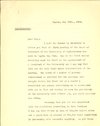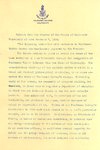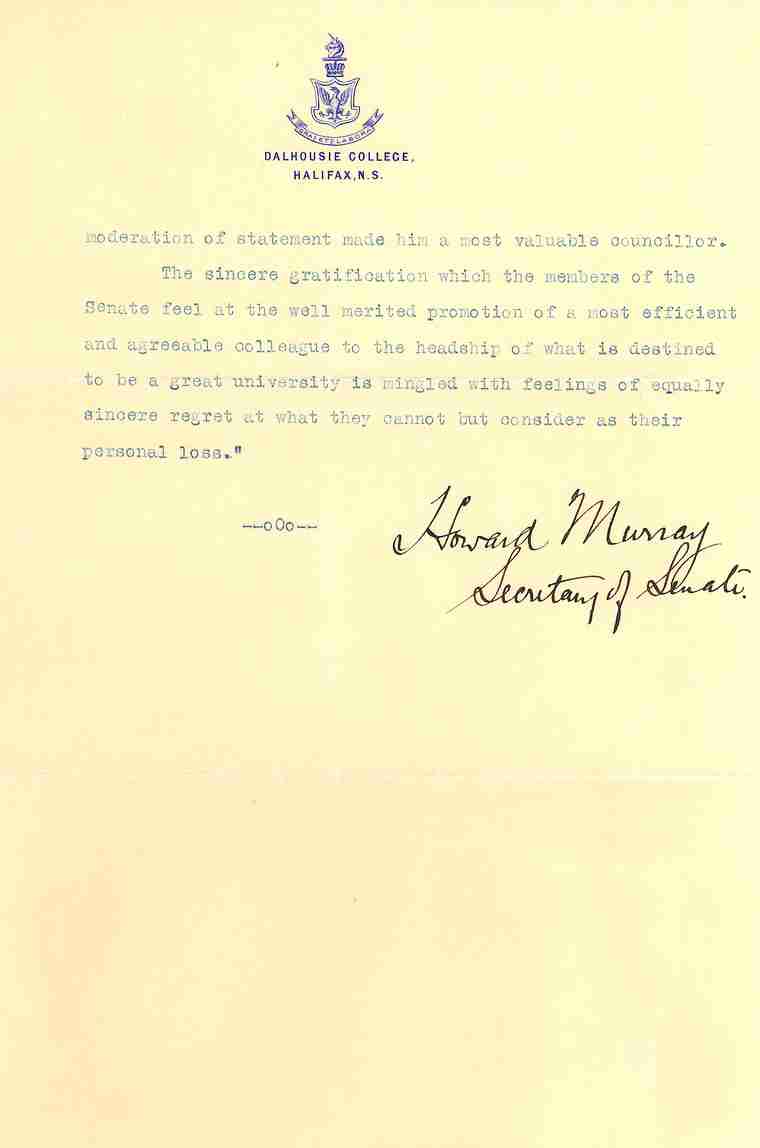“This is a great country and it needs men with large ideas” – Finding a President
Of forty names suggested as possible candidates for president of the University, five were selected for the shortlist: A.T. DeLury, J.A. McLean, W.C. Murray, A. Shortt, and F.H. Sykes.
The letter sent to each of the five short-listed candidates in May, 1908, was the same: asking “whether in case the presidency of the University were offered you, you would consider the offer,” and providing the candidates with “a few points in order to give a general idea of the situation.”
The province was summed up by saying “it has an area of 250,000 square miles and a population at present of 325,000 which population is increasing with wonderful rapidity.”
The predominant industry…is agriculture and while there are other important resources it would seem that the main industry will be, as it always has been, agriculture. The country is developing very rapidly and school districts have been forming at the rate of nearly one a day since the division of the North-West Territories into Provinces in the year 1905.
There are at present two cities in the Province, namely, Regina and Moose Jaw, each with an approximate population of 10,000. In addition there is a very large number of towns destined to be places of importance at no very distant date.
Of the University: “as yet in its infancy. … There are no buildings erected, no staff and no equipment.”
Finally, “So far as the salary of the President is concerned I am directed by the Board to say that this will not be less than $5,000 per anum.”
Privately, to DP McColl, DeLury wrote on 7 June 1908 that “my prospects here [University of Toronto], too, are very good, and as you know my heart is more in teaching than in anything else.” More formally, his letter of response seemed equivocal, although he did not immediately decline consideration [Formal letter Page 1, Page 2, Page 3, Page 4] as did both Adam Shortt [Letter] (being "deeply committed in other directions") and, ultimately, F.H. Sykes (who noted his current position was better paid and had an assured pension, making it potentially "difficult...to accept the position should it be offered") [Letter Page 1, Page 2]. Another individual, George Locke, heard he had been recommended and sent a letter indicating his interest; presumably to ensure a broad enough pool of candidates, his name was added to the list [Letter Page 1, Page 2, Page 3, Page 4, Page 5].
In any event, J.A. McLean, then president of the University of Idaho, had been recommended as or more often than any other candidate, and surely must have seemed the front-runner.
On 2 June 1908, he wrote:
In comparing the outlook for the University of Saskatchewan with the outlook for the University of Idaho I think there can be no doubt that the University of Saskatchewan will mean more to Western Canada from Winnipeg to Victoria than the University of Idaho will mean to the western portion of the United States. Even if the two institutions were equal in income, endowment, number of students and instructional force, the growth of Saskatchewan would be more significant because it represents a type of institution hitherto unknown in the Canadian Northwest.I will ask you therefore to inform the Board …that in case I am appointed to the Presidency of the University of Saskatchewan I will accept the appointment.
…. Unless there are special circumstances with which I am not familiar I think the salary of the President of the University of Saskatchewan ought to be $6000 per annum. … In mentioning this amount I have in mind the fact that the expenses of the president during the first five years of office may be expected to be unusually heavy, and also that I will sever connection with the Carnegie Retirement Fund by accepting the appointment.
… If I am appointed I will be able to go to Regina to meet the Governors any time after June 15th, and could carry the necessary work of both offices during the month of July and definitely assume the office in Saskatchewan August 1st.
The whole missive took less than two full pages, typewritten.
By contrast, on 6 June 1908 Walter Murray sent a 10-page, handwritten response.
It is needless to say that the prospect which is open to me is very attractive. Such opportunities for usefulness seldom come twice or even once. The kindly spirit of your letter promises hearty cooperation and support….
Am I right in thinking that you intend from the first to place the requirements for Entrance and Graduation on a par with those of the leading Universities in Canada?....the evils of low standards are so great and persist so long that one cannot help being anxious about beginning well. Saskatchewan should have the best and the reputation of its University from the outset should be good.
He asked about the location (“Do you think there is any likelihood of its being dismembered and the fragments scattered over the province to satisfy the wishes of ambitious towns?) and assumed “ultimately…a large University with Faculties of Arts, Science, Engineering, Agriculture, Education, Law, Medicine and probably Dentistry and Commerce”. He wondered about the salary for professors before worrying about that of the President, suggesting that for a department head, $2500 with regular increases to $3000 should “secure an excellent staff; and with a staff of able men even if the staff be small there can be no doubt about the result.” As to the President’s salary, he found himself “reluctant to discuss this question…The interest of the President should be subordinate to the University and if either is to suffer it should be the President.” He suggested “Agriculture must be regarded as the sheet anchor of the University. Through it the University can demonstrate its usefulness to the province….At the same time … the humanities must not be subordinated. Are there any signs of a contempt for the humanities or a fanatical devotion to utility that would try to convert the University into a large Agricultural and Engineering College and nothing more. I believe that the College of Agriculture, while distinct from the other Faculties and probably more isolated and independent, should yet be within the University, receiving from the liberal studies a humanizing influence and giving to the whole life of the University a sense of the close relationship between the daily life of the people and the pursuits of the scholar and the scientist. May Saskatchewan be as noted for its fine men and women as for its golden wheat. This expression of opinion may seem unnecessary but the question to me is important. For the answer to it will throw light upon the attitude of the people to higher education and their readiness to support a University planned on large and generous lines.
…I see no reason why I should not seriously consider such an offer with a strong probability of accepting it; provided that the information which I may receive later will confirm my present impressions, and also provided that my going will not seriously inconvenience Dalhousie.
….Should your Governors not go any further in this matter I wish them to know that I greatly appreciate their action in taking my name into serious consideration.”
Both McLean and DeLury appear to have misread the University’s letter: each had assumed they were the only candidate. DeLury caught his mistake, but McLean telegraphed immediately: “If a competition has developed in regard to presidency of university please withdraw my name. DP McColl replied advising that "forty names submitted, four selected for consideration ... may your name stand?
He may have been mollified, for organization began in earnest for a subcommittee of the Board to meet with all the candidates in person – including McLean. [Letter] In retrospect, reviewing their letters, the outcome hardly seems in doubt. The other candidates undoubtedly had abilities in both administrative and educational spheres; but Walter Murray had shown that he had ideas. Murray was hired on 20 August 1908. In its turn, the Senate of Dalhousie University was left to “place on record its sense of the loss sustained…by the resignation of Professor Walter C. Murray…”.
Related Items
Walter Murray’s history of the University, written following his retirement (1941) PDF | Database Entry





